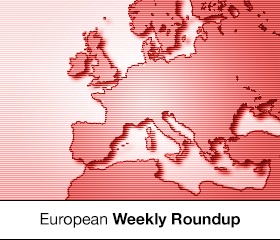Strong Performances by Facebook and WPP; ISBA Criticises UK Agencies
by Sonja Kroll on 29th Apr 2016 in News

ExchangeWire rounds up some of the biggest stories in the European digital advertising space. In this week’s edition: Strong quarters for Facebook and WPP; ISBA calls for transparency; Xaxis appoints Harcus as UK MD; LiveRamp enters UK and FR markets; Unlockd receives funding; Voluum launches martech suite; and Apple considers paid search for App Store.
Show of force in Facebook and WPP quarterly reviews
While Google and Apple disappointed in recent earning calls, Facebook and WPP are on a high. Facebook’s earnings exceeded Wall Street expectations again. Q1 revenue on the social network amounted to almost USD$5.38bn (£3.69bn), leading to earnings of USD$1.5bn (£1.03bn). The stock market rewarded Facebook’s impressive figures with an 8% jump in stock prices, resulting in an all-time high.
Revenues rose by 54% from USD$3.54bn (£2.43bn) in Q1 2015. Analysts had expected a revenue of USD$5.25bn (£3.67bn). Earnings were even more impressive, tripling from USD$512m (£351m) in Q1 2015.
Revenue driver is Facebook’s mobile advertising business; 82% of all Facebook revenues are already on mobile, generated by ads on smartphone or tablet. And, it helps that Facebook’s number of active monthly users has risen to its current 1.65 billion members.
Facebook shares rose 9% in after-hour trading, and traded at a record USD$118 (£81).
As for WPP, the marketing services group announced revenue increases, following a strong performance in the US, the UK, and Western Europe thanks to “strategic emphasis on technology, data, and content, in addition to talent and pricing”, the company said in its financial review.
Global revenues thus increased by 5.1% (like-for-like) to £3.07bn in the first quarter. In the UK, revenues amounted to £451m, a similar growth at 4.7%.
The advertising giant’s net business was USD$1.78bn (£1.22bn) in the first quarter, compared to USD$1.0bn (£690m) in the first quarter last year.
ISBA spearheads call for more transparency
Industry body ISBA, which represents British advertisers, is calling out media agencies on their business practices. In a bid to make advertising transactions and processes more transparent, the industry body has designed a standard contract for deals with media agencies.
“I don’t believe that [the media agencies] have got the best interests of their clients at heart any more”, the Financial Times cites ISBA director Debbie Morrison.
Morrison is referring to complex agency practices that allow the agencies to profit from transactions conducted through them, while not giving clear insights into where the invested marketing budgets are being spent. Add to that the potential of secret agreements among competitors in a market that is dominated by six agencies, namely Dents, Havas, IPG, Omnicom, Publicis, and WPP.
The proposed ISBA document outlines a 51-page contract that itemises the actual allocation of media budget – an attempt to stifle the temptation for agencies to buy media based on incentives by publishers, rather than best-fit.
The contract is intended as a suggestion, and not obligatory for use by ISBA members. Written with the best interests of advertisers in mind, resistance from agencies can be expected, especially when it comes to giving away rebates or other agreements with media owners.
Industry veteran Harcus to lead Xaxis UK
More leadership news at Xaxis UK. After the recent appointment of Nicolas Bidon as global CEO for plista, his now-vacated role has been filled. The media platform has announced Harry Harcus as managing director.
Leading the UK business of the GroupM daughter, Harcus will be tasked with pushing the growth of their native advertising arm, plista, as well as their performance business, Light Reaction.
“We’re excited to have Harry on board at Xaxis. He brings a wealth of industry and institutional knowledge to the leadership of one of our key markets in the EMEA region”, says Caspar Schlickum, CEO Xaxis, EMEA. “He will play a major role in driving continued growth of our UK business.”
Harcus joins Xaxis from GroupM, where he was responsible for the programmatic buying media operations in his most recent role.
“As more media becomes digital, and is traded programmatically, we will focus on further expanding the opportunities for our clients to achieve their goals with effective programmatic solutions”, summarises Harcus his plans for Xaxis’s future.
Earlier in his career, Harcus held senior-level positions as director of digital advertising operations at IPC Media/Time Inc. UK, and head of advertising operations, Europe at AOL (TimeWarner).
LiveRamp expands to UK and France
LiveRamp goes international. The onboarding specialist is taking their offering to Europe after establishing the service in Australia and New Zealand. Now, the UK and France are on the map, the company has announced.
“Marketers are faced with overwhelming complexity created by an explosion of data, devices, and applications. Data onboarding simplifies omni-channel engagement and dramatically reduces waste by enabling everything in the marketing stack to work together”, explains Travis May, president and general manager, LiveRamp. “Our expansion into Europe represents a significant step towards our vision for powering a world where all marketing is relevant.”
Globally- and locally-operating brands can use LiveRamp for activating offline first- and third-party data across their marketing stack. From CRM and sales transaction data, to external measurement and analytics, LiveRamp supports onboarding of data into DMPs, platforms and analytics systems across display, mobile, search, and video.
Funding for Unlockd pre-UK market launch
An interesting new advertising model is getting validation via investment from high-profile investors. Australian tech startup Unlockd announce a series-A funding round of AUD$15m (£8m). The funding comes right on time for the impending launch of Unlockd on the UK market.
The company takes a novel approach to the growing use of ad blockers: in return for serving ads when users unlock their smartphones, Unlockd refunds cash to the users as a reward and incentive.
“The telco industry is facing a continual decline in ARPUs, at the same time as growing competition to keep prices low for consumers. This is due, in part, to the massive increase in data usage per user, as smartphones become the screen for browsing, playing games and viewing content”, Unlockd-CEO and co-founder Matt Berriman says.
The innovative model could thus allow telco companies to reduce their charges, yet maintain revenues, while the cash reward incentivises users to accept customised ads based on preferences and location.
After initially launching in Australia, Unlockd expanded to the US market earlier this year, collaborating with the Sprint-subsidiary Boost Mobile. With a further launch in Asia already in the cards, Unlockd hopes to be active in five markets by the end of 2016.
Industry veterans team up to launch martech platform Voluum
A trio of industry veterans, comprised of ex-Millennial Media execs Stephen Jenkins and Gavin Stirrat, as well as Will King, are launching Voluum, a suite of brand and performance campaign planning and analytics tools.
Built by Polish martech outfit Codewise, Voluum offers a mobile DSP that promises a deeper reach into inventory, bidding on up to one million QPS. At the top of the agenda: transparency and anti-fraud measures.
Says Stirrat: “Voluum has been able to start with a zero tolerance to ad fraud, rather than attempt to identify and remove it from the ecosystem retrospectively, or rely on post-campaign make-goods, as is becoming the worrying norm within the digital industry. Sophisticated analytics technology, including a proprietary app-intelligence database, is applied pre-bid to filter any traffic we suspect may be fraudulent, before it is exposed to our customers.”
Launched in 2014, Voluum’s Tracker is already internationally established and serves clients in 200 countries. With offices in London and Krakow, Voluum is now looking at further international expansion. A California-based office is planned for Q3 2016.
Apple hatches new money-making plan for App Store
Apple is already busy developing a paid search solution for their App Store, with a 100-strong team working on the project, spearheaded by Apple VP Todd Teresi. According to Bloomberg, the feature would allow app developers to pay for having their app listed at the top of search results.
With more than 1.5 million apps on offer, Apple’s App Store has become a complex warehouse of applications. So much so, that consumers are finding it increasingly difficult to find what they are looking for.
And not only that, Apple has also realised that the App Store could be monetised beyond the listing charge - by introducing a sponsored search feature. Currently, Apple receives a 30% cut for each App Store download.
With apps conquering the way consumers use their iPhones, Apple has made changes to the App Store in the past, notably acquiring app search-engine Chomp in 2012. Apple may also work on new discovery tools for App Store users. The company has not yet commented on the speculation.
Ad BlockingAd ServerAdvertiserAgencyAppleAustraliaDataDSPEarningsEMEAFacebookMeasurementMobileProgrammaticPublisherSearchTechnologyTransparencyUK








Follow ExchangeWire